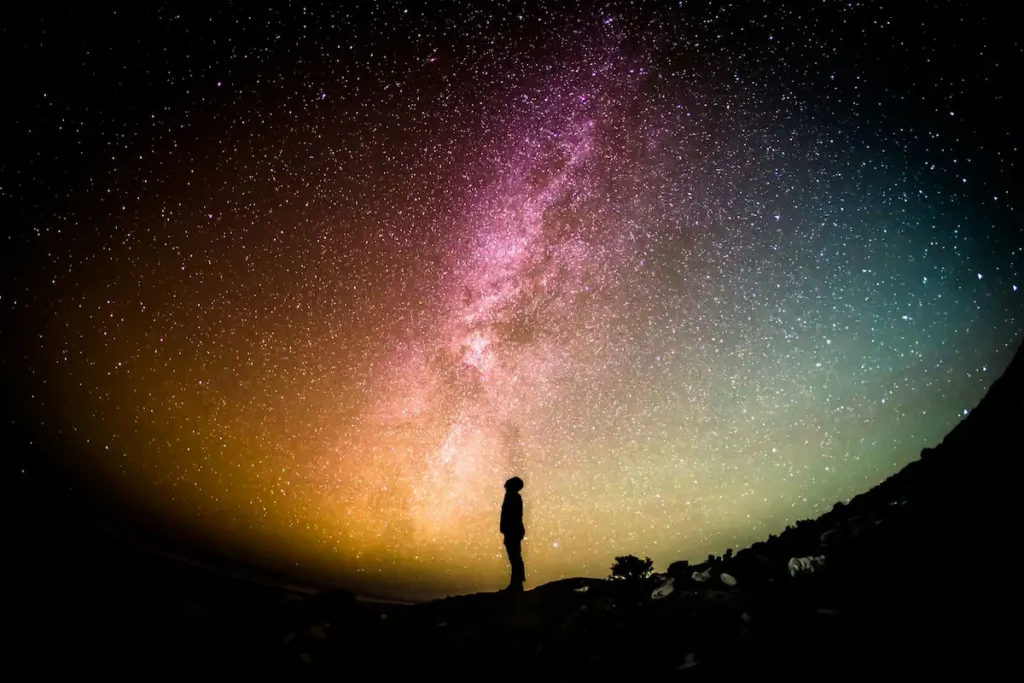We stand before this great world. The truth of our life depends upon our attitude of mind towards it—an attitude which is formed by our habit of dealing with it according to the special circumstances of our surroundings and our temperaments. It guides our attempts to establish relations with the universe either by conquest or by union, either through the cultivation of power or through that of sympathy. And thus, in our realisation of the truth of existence, we put our emphasis either upon the principle of dualism or upon the principle of unity.
Rabindranath Tagore.
Although I have been familiar with the general concept of interdependence, upon reflection, I notice nuances that I had not previously perceived. It is a change in perspective, but one that needs constant awareness. It is in the details that I find it so surprising how much I did not and still do not see its presence. I used to think about interdependence abstractly and intellectually until I noticed how many layers of it I can observe even in my daily life.
I like to think that everything is held together by gravity on this moving planet.
I offer some questions, as well as my answers for the moment, which are just one perspective. Please consider these questions if you feel the inner pull to look at the world differently.
Questions to reflect on the theme and some thoughts on them.
1. Is interdependence new to us, or is it that our awareness of it has become more necessary?
The interdependence of nature, our fellow humans, animals, and the planet we inhabit is an integral part of our lives. “I’ve got it” is a common expression. I live with the illusion that I am independent and separate. As I learn about interdependence, I move from being separated to feeling connected, as if the entire world can function collaboratively, even in ways that I may not understand. Isn’t this idea more appealing?
There are many examples of interdependence I invite you to consider, such as our food source, the air we breathe, and our relationships, which are vital to a healthy existence. We live in homes made and manufactured from many different sources. Functioning and flourishing governance can only succeed based on interdependence among all involved. Our economic resources are intrinsically related to the help of many nations. I used to think of interdependence in an abstract manner until I began to consider its many layers. Nature shows examples all the time. How much of it do we see?
Other Thoughts?
2. What makes us resist the awareness of interdependence?
The fear of acknowledging we are part of nature plays a significant role in it. I like to think that I am big and yes, I am, concerning small creatures on this planet, but very small when I look at myself from the perspective of space. Humans, throughout history, have generated a construct that we are unique and, therefore, different from other animals. We fought against all that is different out of fear of sharing resources and valuing the power of conquest.
And yet is not humankind itself, pushing on its blind way, driven by a dream of its greatness and its power upon the ark paths of excessive cruelty and excessive devotion. And what is the pursuit of truth, after all?
Joseph Conrad
We have a history of hierarchical thinking and acting that distances us from what is different and does not recognize the need to integrate oneself with others. Humans have constructed a power relationship with nature, and anything that seems slightly threatening prevents awareness of interdependence. History, as told, has informed us that we are high in the structure of God, angels, and men, well, woman in my case.
Man with all his noble qualities, with sympathy which feels for the most debased, with benevolence which extends not only to other men but to the humblest living creatures, with his god-like intellect which has penetrated into the movements and constitution of the solar system – with all these exalted powers – Man still bears in his bodily frame the indelible stamp of his lowly origin.
Charles Darwin
Charles Darwin allows me to reflect on my commonality with other creatures. The subjective consciousness offers an exceptional capability that may enrich life experiences; how do I think of myself as an animal? What do I lose for not acknowledging that aspect of myself?
When I integrate myself with my nature and belong to all that exists, I find the importance of interdependence.
3. What are the consequences of the lack of acknowledgment of belonging to the animal kingdom?
Melanie Challenger, author of the book “How to Be an Animal,” offers us a different history of humankind. This is one book that not only allowed me to think differently but also changed my overall perspective on how I relate to life. The author believes that our hierarchical stance on animals from the beginning created a distance between humans and animals, leading to a hierarchical way of thinking. Humans use animals, and therefore, human beings’ power over them is generalized to all those who are different, according to her. More importantly, we distance ourselves from belonging to the animal world even more significantly when there is a manifestation of animal characteristics; some of those are looked at disapprovingly or, at times, seen as disgusting, such as women nursing a baby in public, and especially, when we have to deal with thoughts and facts about death, etc.
By dissociating our mind from our body, we separate ourselves from all those who are different, leading to a sense of power over others. We value our minds over our bodies, blind to their intrinsic connection. She offers a much broader perspective than the one I described, but her thesis is that we have acted and continue to act based on the dissociation we try to maintain from our bodies.
The full awareness of interconnectedness allows me to value what is different.
Other Thoughts?
4. What do I need to cultivate to incorporate the awareness of interdependence?
4.1 Awareness – Looking at the food I cook, the transportation I use, and everything around me with the complete understanding that so many hands have been part of what surrounds me.
4.2 Humility – Many beings have very complex intelligence. Although different, they lead whole lives. An ant has 250,000 neurons in its tiny head; a colony, on average, has more than 20,000 individuals living in it. They can use their bodies to create bridges and rafts. I am only Stardust when I look at the universe and compare myself to its immensity.
4.3 Connection – I learned that a diver in his boat in the ocean came across a dolphin calling his attention. When the diver noticed, the dolphin motioned him to dive. He did it and found a pregnant dolphin trapped in a net. The diver went up again to get help and tools to free the dolphin. When that was done, both dolphins went up and, in their way, thanked the diver for his work. Nature is full of examples that illustrate the love and care that other animals show to one another.
I enjoy being on the street, entering a store, or taking public transportation and sparking a conversation with someone. It’s a truly joyful moment for me. At times, I learn a great deal from these brief interactions.
4.4 Observing/Learning/Understanding – Our basic needs are like those of all other beings. We need food; we need kindness; our body needs care; we need affection and compassion.
Interdependence leads to kindness, and it requires a form of wisdom to be kind, to acknowledge and consider the needs of others, even when it may be difficult.
I recently watched a movie for the second time, “Lunana, a Yak in the Classroom.” This movie is an excellent example of interdependence and kindness. I realized that genuine kindness is also the wisdom of the heart. Watching it with friends, I also learned that some of their experiences provided meaning to the images that were new to me. I find it so important to see the world through other people’s eyes.
5. Flexibility of the mind – It is vital to change one’s mind when confronted with contrary evidence. We are experiencing a crisis because of rigid ways of thinking. Our well-being depends on the ability to acknowledge what we do not know and our willingness to reflect on it.
Being aware of interdependence enriches my life.








